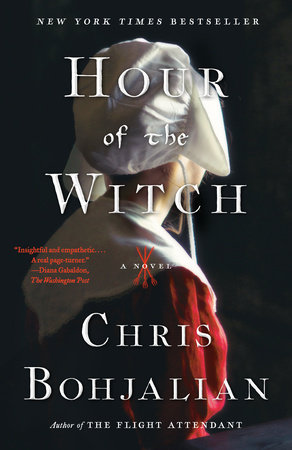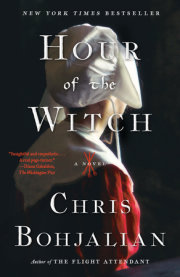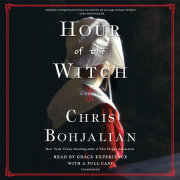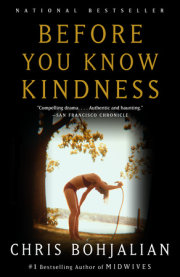Prologue It was always possible that the Devil was present.
Certainly, God was watching. And their Savior.
And so they were never completely alone. Not even when they might wander out toward the mudflats or the salt marshes which, because they all but disappeared at high tide, they called the Back Bay, or they happened to scale the Trimountain—three separate hills, really, Cotton and Sentry and Beacon—they had virtually flattened as they moved the earth to create the jetties and wharves and foundations for the warehouses. Not even along the narrow neck that led to the mainland, or when they were in the woods (most definitely not when they were in the woods) on the far side of the slender spit.
They knew there was something with them when they were otherwise alone in their small, dark houses—the windows some-times mere slits and often shuttered against the wind and the cold— and a man could write in his diary (his ledger, in essence, in which he would catalog the day’s events and his state of mind in an effort to gauge whether he was among the elect), or a woman could scribble a few lines of poetry about the trees or the rivers or those astonishing sand dunes that rolled in the night like sea waves.
Sometimes the presence was frightening, especially if there were other indications that the Devil was at hand. But then there were those moments when it was comforting, and they, mere sheep to their divinity, felt the company of their shepherd. It was soothing, reassuring, breathtakingly beautiful.
Either way, more times than not, the women and men took consolation in the notion that there were explanations for a world that was so clearly inexplicable—and, usually, inexplicable in ways that were horrifying: a shallop with a dozen oarsmen disappearing beneath the water somewhere between the piers and the massive, anchored ship with its barrels of seasonings, its containers of gun-powder, its crates of pewter and porcelain and pillowbeers. That shallop vanished completely. One moment, sailors on the docks in the harbor could see it plainly. But then the clouds rolled in and the rains began, and the boat never emerged from the froth and the foam, and the bodies never were found.
Never.
Or that farmer who was gored through the stomach by a bull and took three days, every moment of which he was in agony, to die in his bedstead. How do you explain that? By the end of the ordeal, the feathers and cornhusks in the great bag beneath him were as red as the linen in which they were wrapped. Never had it taken a man so long to bleed out.
Three days. A number of biblical import.
But, still. Still.
How do you explain a husband who will break his wife’s leg with a fireplace poker, and then chain her around the waist to the plow so she can’t leave his property? And who then goes away? The woman waited a full day before she began to cry out.
How do you explain hurricanes that suck whole wharves into the sea, fires that spread from the hearth to the house and leave behind nothing but two blackened chimneys, how do you explain droughts and famines and floods? How do you explain babies who die and children who die and, yes, even old people who die?
Never did they ask the question
Why me? In truth, they never even asked the more reasonable question
Why anyone? Because they knew. They knew what was out there in the wilds, and what was inside them that was, arguably, wilder still. Though good works could not in themselves change a thing—original sin was no fiction, predestination no fable—they might be a sign. A good sign. Sanctification followed justification.
And as for divorce . . . it happened. Rarely. But it did. It was possible. At least it was supposed to be. Mediation was always better than litigation, because this was, after all, a community of saints. At least that was the plan. There were the tangible grounds: Desertion. Destitution. Bigamy. Adultery (which was indeed a capital crime because of the Lord God’s edicts in Leviticus and Deuternomy, though no adulterer ever was actually hanged). Impotence. Cruelty.
It was a violent world, but still you weren’t supposed to strike your spouse. At least not without provocation. Mary Deerfield knew all this, she knew it because God had given her an excellent mind— despite what her husband, Thomas, would tell her. And though brains hadn’t helped Anne Hutchinson (Winthrop himself opined that her problem was that she meddled too much by trying to think like a man), and in later years brains most definitely would not help the score of women who would be hanged as witches in Salem, she knew intellectually she had done nothing wrong and didn’t deserve to be hit like a brute animal. She wouldn’t stand for it. It seemed that her mother and father, bless them, wouldn’t demand that she stand for it, either.
The issue, of course, would not merely be his violence, nor would it boil down to a debate over what she said versus what he said. The wrack of their marriage was not solely his cruelty, and the divorce petition would be grounded by snares beyond her ken. Here, she realized, there were times when she would have been better off if she could have been alone but for the angels or her God, and— conversely—there were times when she would have given a very great deal for a witness that was human.
Because even for a mind as sharp as Mary Deerfield’s, it was the recognition of her own mean desires and roiling demons where things began to grow muddy.
One
There were two mistakes young men would make when they would first pick up a scythe: they would try to do all the work with their arms, and they would make their swathes far too wide. They would attack the grass, as if they thought it would get up and run away if they didn’t kill it quickly. It would be their fathers or their uncles who would demonstrate how much better off they would be if they would put their backs into the motion too, swinging the snath in an almost indecent, leisurely, metronomical sway. Draw the blade back, hands on the nibs, as the right leg strides ahead; then cut--imagine that sickle moon is the tip of a pendulum on a tall clock--as the left leg walks forward. That was the way.
If the blade were sufficiently sharp, great tufts of grass would collapse around the metal as it advanced through the field, and their arms would not feel like anvils.
The first time that Mary Deerfield’s husband hit her, she didn’t relate the motion to scything: she was in too much pain and she was too surprised. Her skin stung. It was the second time, half a year later, just before she turned twenty and just after the first anniversary of the day they were married, that she noted that he punched her the way a knowledgeable man would scythe. His arm swung effortlessly, the movement graceful and efficient. An arc. She fell against the pumpkin pine table, the pewter candlesticks toppled over, and the tankard of hard cider he had been drinking spilled onto the floor and into the trencher with their dinner. Still, however, she saw most clearly the image of the men scything--the details from her memory more concrete in her mind than even the way the cider was puddling that moment in the stewed pumpkin--and the wavelike rocking of their upper bodies and arms.
He called her a whore and she said he knew that she wasn’t. He said he had seen her looking at other men, younger men, with lust in her gaze. She said this wasn’t true, but she thought he was going to hit her again. And so she prepared herself for the blow, her shoulders scrunched against her neck and her hands before her face. But he didn’t hit her. He was shaking with anger, unfounded though it was, and she hoped a good measure of guilt, but he didn’t strike her again.
Instead he stomped out the door, saddled Sugar, a handsome eight-year-old gray gelding with a black mane, and he was gone. She placed her fingers on her cheek and wondered at its warmth. Blood gathering under the skin? There would be swelling, it was inevitable, and she was glad that they had been alone. She was dizzy with shame. She took his mug and held the cold pewter against the skin where he had hit her, and sat down in her chair. She contemplated a mystery: How is it I am humiliated when I am alone? Does not humiliation demand an audience?
Four years later, Mary Deerfield’s husband snored beside her in bed. In public, he was never a loud or offensive drunk, which was probably why he had never been fined or sent to the stocks. He kept his anger inside his home, and rarely (perhaps never) did he allow it to vent when their young servant girl, Catherine, was present or when his grown daughter would visit. Mary thought she heard the girl moving downstairs now, somewhere near the fireplace, but she couldn’t be sure. It might have been the wind.
The poor girl’s brother was dying. The boy was Catherine’s twin, and he had always been more frail than his sister. The two of them were eighteen. He probably wasn’t going to make it through the fall. Like her, he was indentured. Catherine said this evening that he had managed to nibble at his supper and keep down a little meat, but otherwise his complexion was bad and a few pieces of pork weren’t going to prevent him from withering away.
When Mary’s husband had returned tonight from the tavern, she had pretended she was asleep. He had stayed extra late. She had felt him looking at her, but she knew that he wasn’t going to wake her to apologize for striking her earlier that evening. (And he certainly hadn’t been watching her because he had been contemplating the idea they would couple. There wasn’t a prayer of that, not after all he had probably drunk.) Over the years, a pattern had emerged. He’d drink, he’d hit her, and he’d go away to drink some more. The next day, he would say he was sorry. She presumed he would apologize in the morning for hitting her again tonight. He would insist on his own sinfulness before leaving for church. She recalled what they had squabbled about: the garden looked weedy and unruly, and he felt it reflected badly on him. At least that was how it began. She knew he had other demons that pricked him with tines as sharp as needles.
Thomas was forty-five, not twice her age, but close enough. She was his second wife, his first--the former Anne Drury--having died eight years ago, soon after Mary’s own family had arrived in the colony, when Thomas’s horse had kicked her in the jaw and snapped her neck. Thomas had shot the animal that night, even though it had been a docile beast until that terrible evening. He and Anne had had three children together, two of whom had died young, but a third, Peregrine, was an adult now. The woman had married only weeks before Mary herself had wed Peregrine’s father. Consequently, Mary had never lived under the same roof with her, and given the reality that the two were contemporaries, she was glad. After all, she was both Peregrine’s stepmother and her peer: she couldn’t imagine having to discipline someone almost her age. Peregrine was more like a stepsister than a stepdaughter, albeit a stepsister who, Mary suspected, didn’t much like her for the simple reason that she wasn’t Anne. Peregrine now had children of her own, which meant that Mary, though only twenty-four, was a grandmother. The idea on occasion left her doleful and reeling.
She closed her eyes and listened to the sounds of the autumn night. There were still leaves on the trees in the marketplace and the commons that hadn’t been girdled, but soon those leaves, too, would fall, and there would probably be a killing frost as soon as the moon was full. It was well beyond half now. She touched the spot on her face where Thomas had hit her, aware that people might ask what had happened in the morning. Then, while conjuring a reason for the bruise that she could tell them, she fell into a deep sleep.
I know the taverns and ordinaries. That is no secret and nothing for which I need either this court’s or the Lord’s forgiveness. But have I ever been fined for too much drink? No. Hast thou ever lashed me publicly for such offense? Of course not. This court knows me, it knows my mill. And, yes, though there is evil within me and my heart is inclined to sin; though I have reason often to be ashamed before God; the truth is that I have tried always to glorify God in all things. Though I will have many failures to answer for in the end, my comportment toward my wife, Mary Deerfield, will not be among them.
--The Testimony of Thomas Deerfield, from the Records and Files of the Court of Assistants, Boston, Massachusetts, 1662, Volume III
Two
Mary Deerfield knew she was beautiful. Her eyes were delft blue, her skin as pale and smooth as the porcelain on which they occasionally dined back in England when she was a girl, and so there were moments when she worried that her conceit was a sign she should watch. It was not good to be prideful.
Still, as she dressed for church she was relieved to discover that Thomas had struck her just close enough to her ear that she could actually hide the bruise under her coif if she tied it snugly around her face. Early that summer, she’d had to tell her neighbors that she’d walked into a cloak peg in the night, and she had been teased for her clumsiness by everyone but her mother, who, Mary feared, suspected the real source of the black-and-blue mark.
Church today would begin at nine, end at noon, and resume at two. This had been a good summer, with enough rain and sun that the men had gotten in three cuttings of hay for the winter, and the crops in the fields had grown larger than she had ever seen them here in Massachusetts. There were pumpkins nearly the size of butter churns. Today would be a service in which they needed to humble themselves before God and thank Him for their good fortune. The Devil had been noticeably absent, save, perhaps, for the death of the two babies on Marlborough Street and His visit to poor Catherine’s dying brother. In all fairness, the pitiable William lived in a home in which everyone knew the family hadn’t buried an ox bone in the foundation of the house when they had built it, or glazed any of the bricks in the chimney with salt. Some people had suggested that the babies’ deaths were the work of witches, not the Devil, but Mary saw only hysteria in that sort of speculation. Babies died all the time. And there had been no women she had seen or heard about who had manifested possession. If the Devil was recruiting handmaidens that summer, it was to the southwest in Hartford.
The truth was, it had been a lovely summer and a most pleasant September. The mill her husband owned would be grinding flour and cornmeal throughout the autumn and into the winter, and that might keep him in good spirits. When he was busy, he was happy, and he would drink only as much cider and beer as he needed to quench his thirst. Last night, she told herself as she finished dressing for church, would be the last time for a long time. Months. He really didn’t become drunk all that often. Soon enough he would wake, perhaps catch her gazing at her reflection or adjusting her collar or cuffs as they ate, and tease her gently for her vanity. He’d apologize and once more things would be well.
Or, at least, well enough. Tolerable.
Downstairs she heard Catherine uncorking the jug with the molasses and preparing their breakfast. One last time she checked her coif to be sure that it hid her bruise, and then she went down the stairs--a luxury here that she didn’t take for granted, since so many of her neighbors still had mere ladders connecting their first and second floors--and through the parlor, before joining the girl in the kitchen.
“Good Sabbath to thee, Catherine,” she said.
The girl smiled and bowed her head slightly. “I don’t hear Master Deerfield,” she said. “Is he well?”
“We’ll hear him any minute. He’s still asleep.”
She saw that Catherine had already latched her bedstead upright against the wall and set the table for breakfast. The girl didn’t have her own chamber the way that she and Thomas did on the second floor, but slept instead here in the kitchen and hall. The house, Mary knew, was impressive by Boston standards--her husband was a miller, so it was only fitting--but it paled against the home in which she had grown up in England. Here they had six rooms on two floors, not including the cellar but counting the storage room back of the kitchen. (She had to stoop when she went back there, and it had now gotten to the point where Catherine knew that corner of the house better than she did.) There was a nice hall and a parlor and kitchen on the first floor, and two spacious chambers on the second. There was a massive fireplace linking the kitchen and hall, a second, smaller fireplace in the parlor, and even a modest fireplace in the chamber she shared with Thomas. She knew of no more than a dozen other homes with three fireplaces and three chimneys, and one belonged to the governor, one to the reverend at the First Church, and the others to especially wealthy Boston merchants and traders, including her father.
She continued to hope that someday she would have children who would sleep in that second chamber--the way Thomas’s daughter from his first marriage had had her own room in the first house the man had built here--but she had understood for some time now this wasn’t likely. After all, they’d been married over five years.
“It was a late night for him,” Catherine said, referring to Thomas, and she was careful to allow no hint of disapproval to color her tone. But she never did. The girl rather fancied Thomas. Mary could see it in the way her cheeks sometimes grew flushed around him or the way she would hang on his words as if he were a pastor. She hovered over him and sometimes seemed to follow him like a well-trained dog.
“It was,” Mary agreed, glancing at the pot over the fire, and pausing to savor the plaintive trilling of the mourning doves that had nested in the oak just outside the kitchen window. They were continuing to coo when she heard Thomas waking, but Mary stopped listening to the birds so she could focus on the noises above her. Sometimes she could tell her husband’s mood by the first sounds he would make in the morning. If his day began with a great contented stretch and yawn, he would remain in good spirits, at least through their midday dinner. If, on the other hand, his lungs were packed and he began either by coughing or spitting, then he would be ornery and she would find herself hoping that he would remain at the gristmill until the end of the afternoon when he returned home for supper.
She heard the thump of his feet hitting the hardwood floor, followed by a sound that could be likened to a great male cat purring: the low rumble that Thomas Deerfield would make when he would stand, drowsy and well pleased with his world, on a good morning.
She wanted to look at Catherine for the reassurance that the girl had heard it that way, too, but Thomas was a gentle patriarch around Catherine. The girl may have known that her master had a temper, but it couldn’t have seemed extreme to her, and any discipline he exerted upon his wife in front of her was well within reason. Besides, Mary refused to acknowledge that her home’s tranquility was really so fragile, and so she focused instead on taking the Psalter down from the shelf and finding one of the psalms with which Thomas liked to open their day.
Copyright © 2021 by Quaker Village Books LLC. All rights reserved. No part of this excerpt may be reproduced or reprinted without permission in writing from the publisher.










